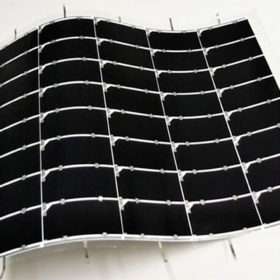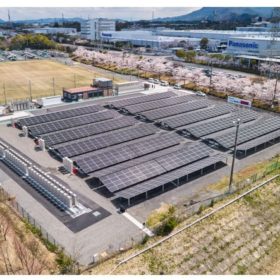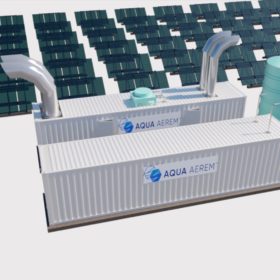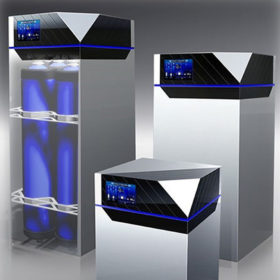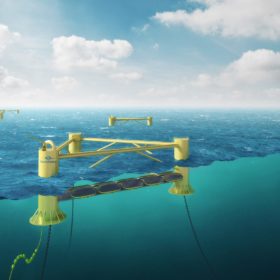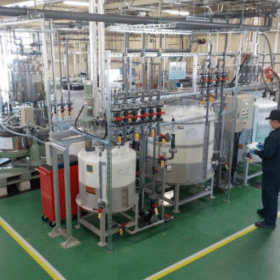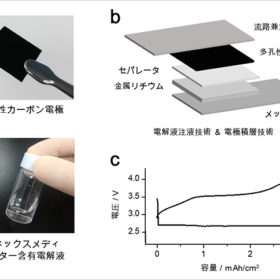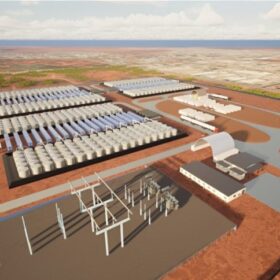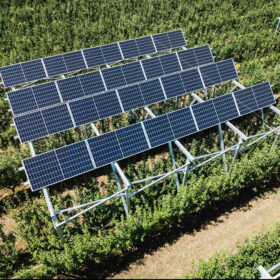Sharp achieves conversion efficiency of 32.65% in flexible, lightweight solar module
The new prototype uses a triple-junction compound design, which sandwiches the solar cell between layers of film. The module is expected to be used in a variety of vehicles, an application that demands high efficiency and lightweight construction. Its conversion efficiency bests that of a similar Sharp module developed in 2016, which notched an efficiency of 31.17%, at the time a world record.
Panasonic combines fuel cells, batteries, PV to power factory in Japan
Japan’s Panasonic claims its new pilot solar-plus-hydrogen facility marks the first attempt to create a factory powered by 100% renewables, via the full-scale use of hydrogen.
10 GW Desert Bloom green hydrogen project attracts major Japanese partner
Water-from-air technology company Aqua Aerem’s Desert Bloom green hydrogen project received Major Project Status from the Northern Territory Government last year, now it has announced a partnership with Japanese energy giant Osaka Gas which not only brings the 10GW project closer to reality, but has also seen the company boost its ambitions to 20GW in light of “quickly developing demand.”
Celebrated inaugural hydrogen shipment now under investigation
Hailed as a landmark for Australia’s vision of becoming a global hydrogen exporter, the Suiso Frontier’s first shipment of liquid hydrogen from Australia is now under investigation after a flame was seen coming from the gas combustion unit’s exhaust on deck.
Toyota develops new module to store, transport hydrogen
Japanese automaker Toyota has used its hydrogen tank tech in a new module to expand hydrogen storage to railways, shipping facilities, cargo ports, and fuel cell generators. Its 70MPa tank has a storage capacity of 2.7 kg to 18.7 kg and a tank mass ranging from 43.0 kg to 243.8 kg, depending on the size.
Perth ocean energy company gets funding boost from Japanese shipping giant
Western Australian ocean energy company Bombora Wave Power has received an investment of $6.74 million to deliver its pilot projects and commercialise its technology from one of the world’s largest shipping companies, Japan’s Mitsui O.S.K. Lines.
International partnership pushes Western Australian vanadium electrolyte plant toward reality
Western Australian vanadium explorer Technology Metals Australia and Japanese vanadium redox flow battery producer LE System have decided to tighten their relationship with an expanded Memorandum of Understanding that could see the construction of Australia’s first fully integrated vanadium electrolyte plant proximate to renewable energy hubs and major Australian population centres.
Weekend read: Australia to make world’s-first liquefied hydrogen shipment to Japan
The Suiso Frontier cargo vessel docked at Victoria’s Port of Hastings on Friday to take on the world’s first shipment of liquid hydrogen. The ship’s arrival is a landmark for the Japanese-Australian Hydrogen Energy Supply Chain pilot project, which sees liquefied hydrogen generated from brown coal, and an engineering milestone in itself. But while the Australian government describes the product as “clean”, experts maintain that carbon capture and storage technology has proven only to be an expensive failure.
Green hydrogen could disrupt global trade, bilateral energy relations
While there are still many uncertainties as to the way in which hydrogen trade might evolve and change economic ties and political dynamics between countries, experts agree that green hydrogen can bring winds of change to the global energy arena. According to the International Renewable Energy Agency, significant geoeconomic and geopolitical shifts are just around the corner.
Japanese consortium builds lithium-air battery with energy density of 500 Wh/kg
A Japanese group has developed a storage system with potential applications in residential storage, electric vehicles, drones and Internet-of-Things devices.
